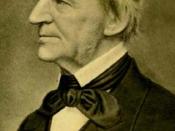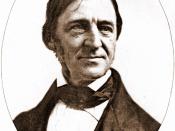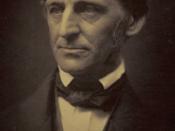When Ralph Waldo Emerson declared to the Phi Beta Kappa Society at Cambridge that nature was "the first in importance of the influences upon the mind," on August 31st, 1837, he became the first man to understand the true connection between man and nature. Nature has a profound impact on the way a man thinks or acts, and can reflect society subtly, as noted in Emerson's "The American Scholar," "Nature," and "The Rhodora," as well as Winslow Homer's "High Cliff, Coast of Maine."
In "The American Scholar" and "Nature," Emerson states that men can find part of themselves in nature. "Nature is the opposite of the soul, answering to it part for part . . . Its beauty is the beauty of his own mind," he says in "The American Scholar." To know himself, one must find a connection with nature. Nature, in itself, also represents the wisdom of a peaceful man.
A man can find himself as one with nature. Only truly wise men can find this indescribable peace when being with nature instead of just looking at the snow or the sky. In fact, often one finds a childlike innocence in himself. In "Nature," Emerson writes that "the lover of nature is he whose inward and outward senses are still truly adjusted to each other; who has retained the spirit of infancy even into the era of manhood." The simplicity and the fresh beginnings of learning associated with youth are apparent when a man is connected with nature.
Nature also offers joy in place of dreariness, which further symbolizes its effect on a man's actions, as described in "The Rhodora: On Being Asked, Whence is the Flower?" Whenever a person is depressed in any way, if he walks outside and associates himself with nature, he can find bliss...



Nice!
Nice expression and all...I haven't heard before about Emerson's sayings for nature.
Interesting stuff and you do have a closing sentence but I would enclose the essay with a more ecological message more suited to our troubled days....you could say "Emerson's words about the advantages of nature for human beings are eternal; if only man would take heed of these words and protect nature as he should..." or something like this...by the way interesting stuff said more than 150 yrs ago...
1 out of 1 people found this comment useful.